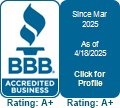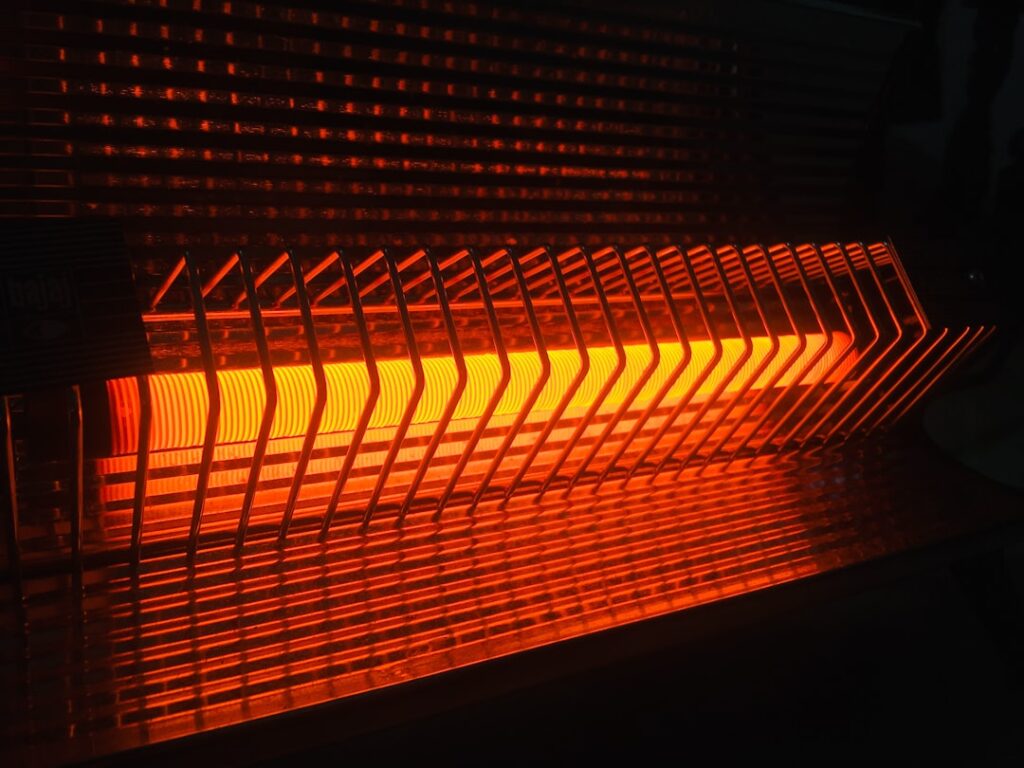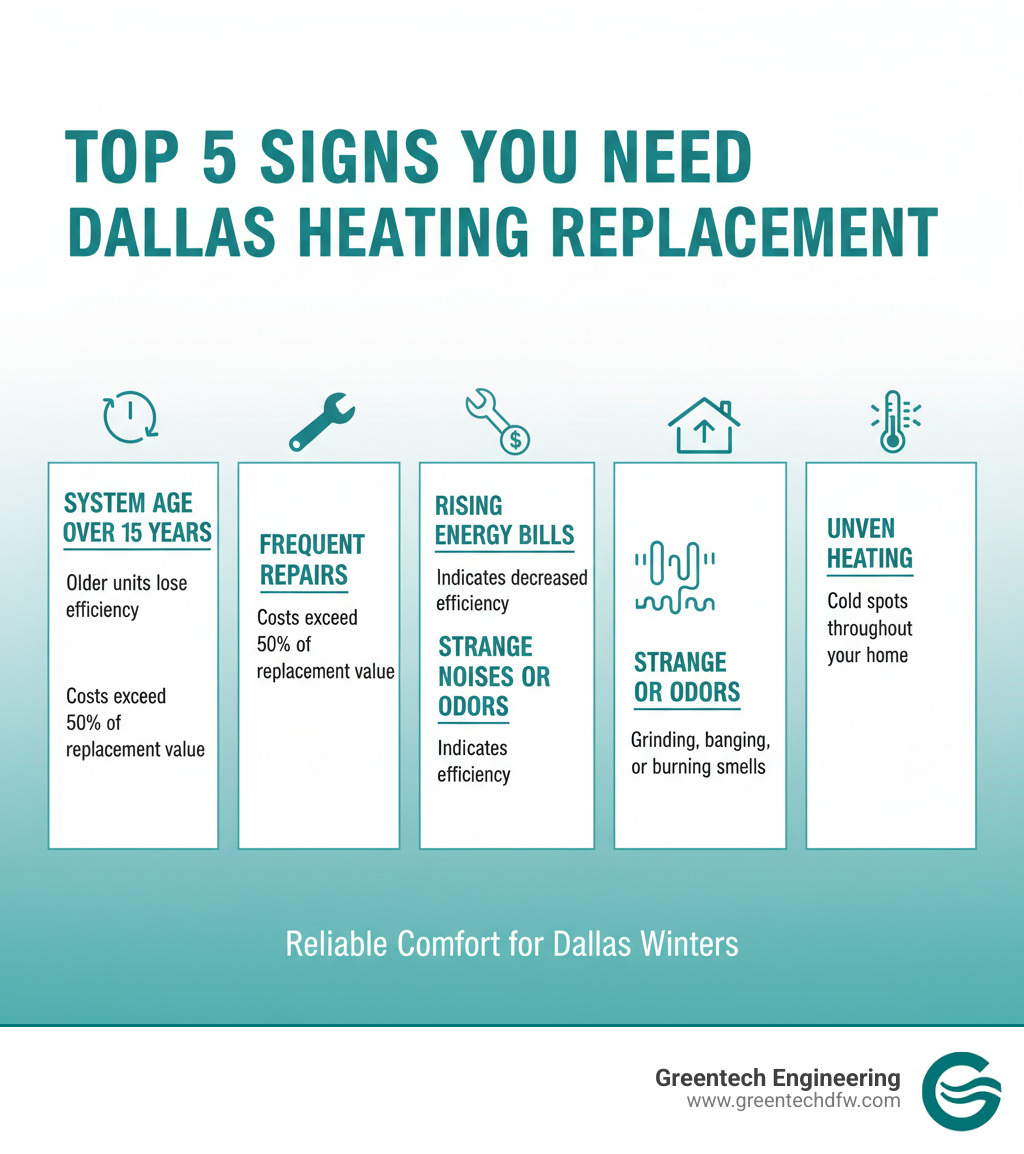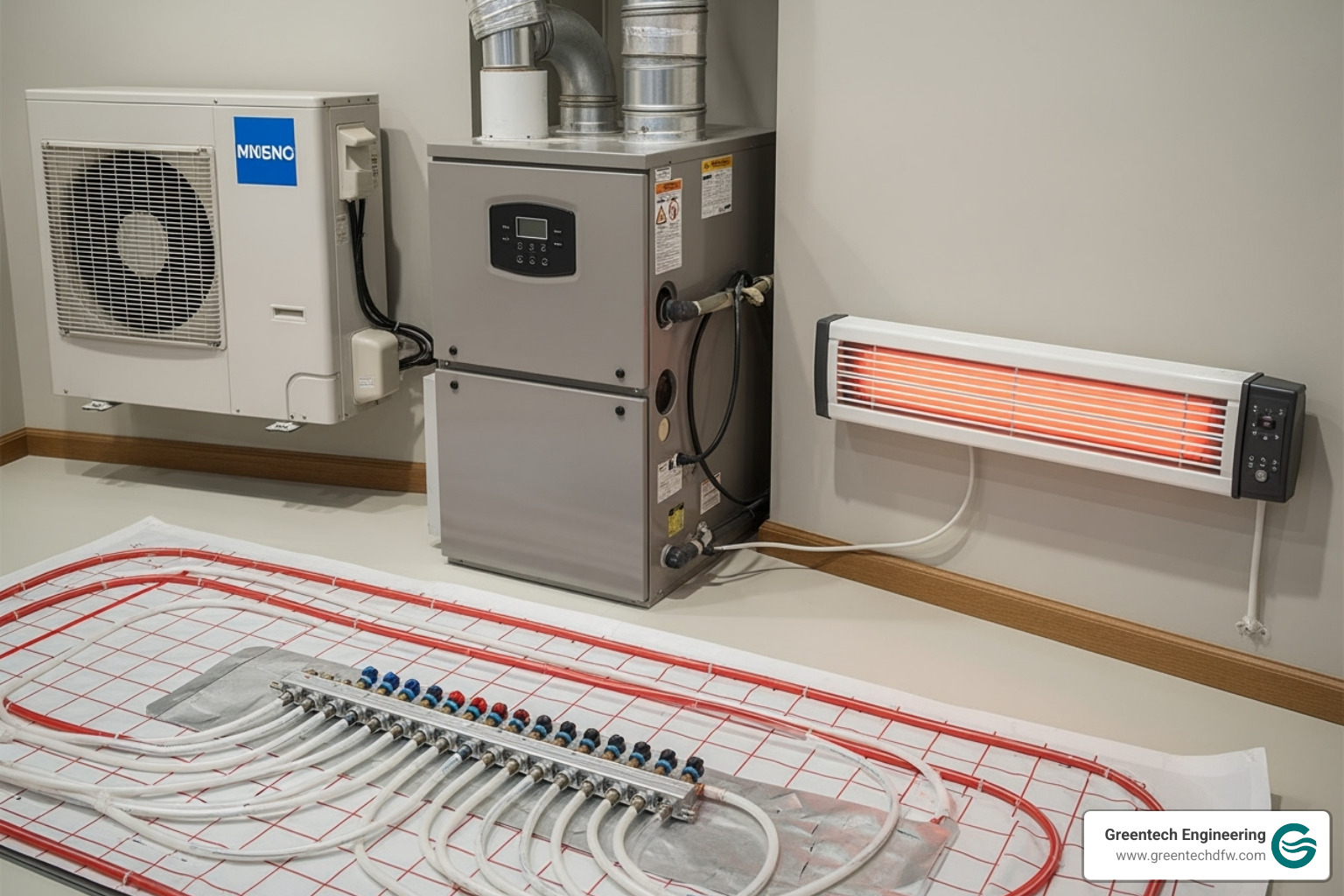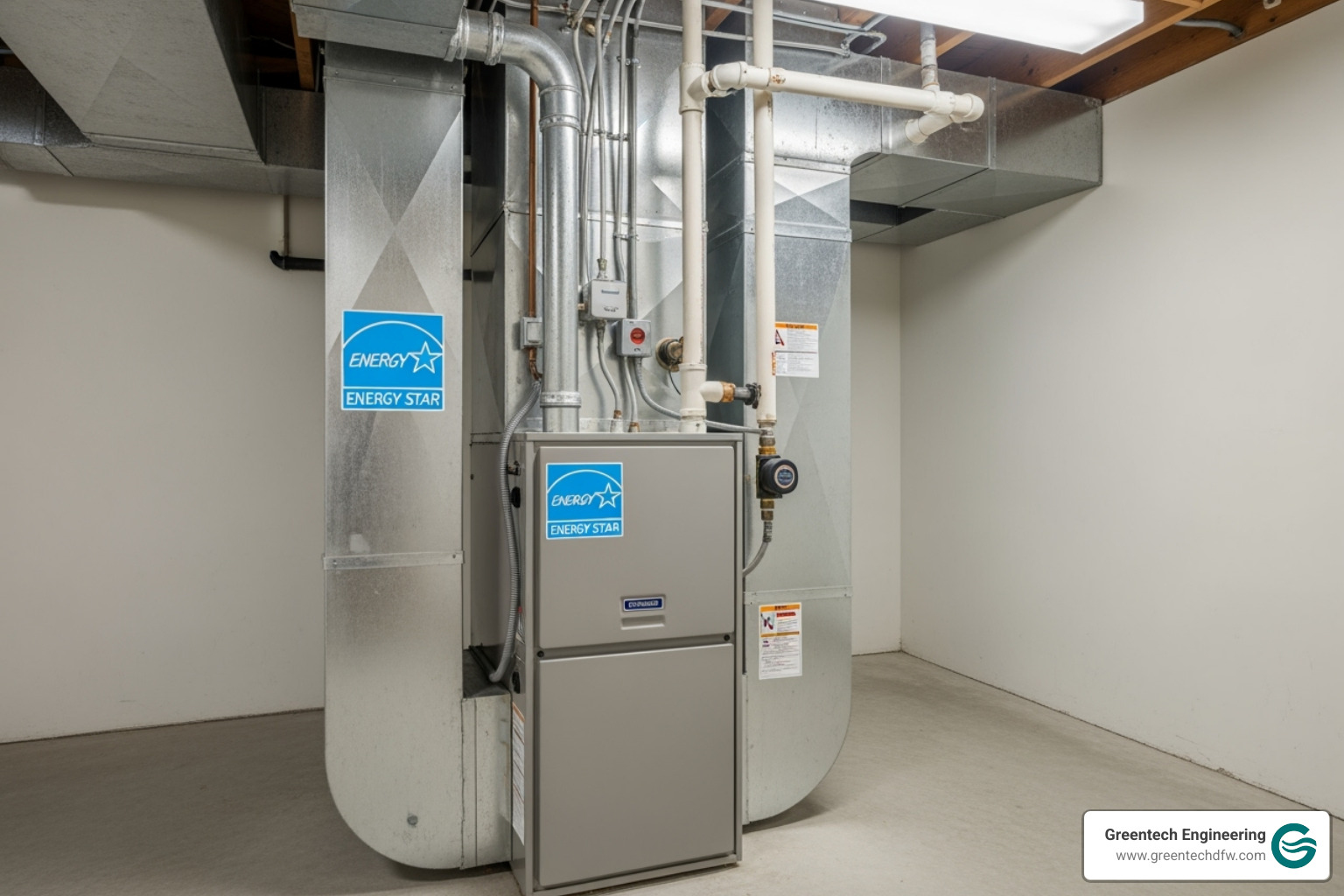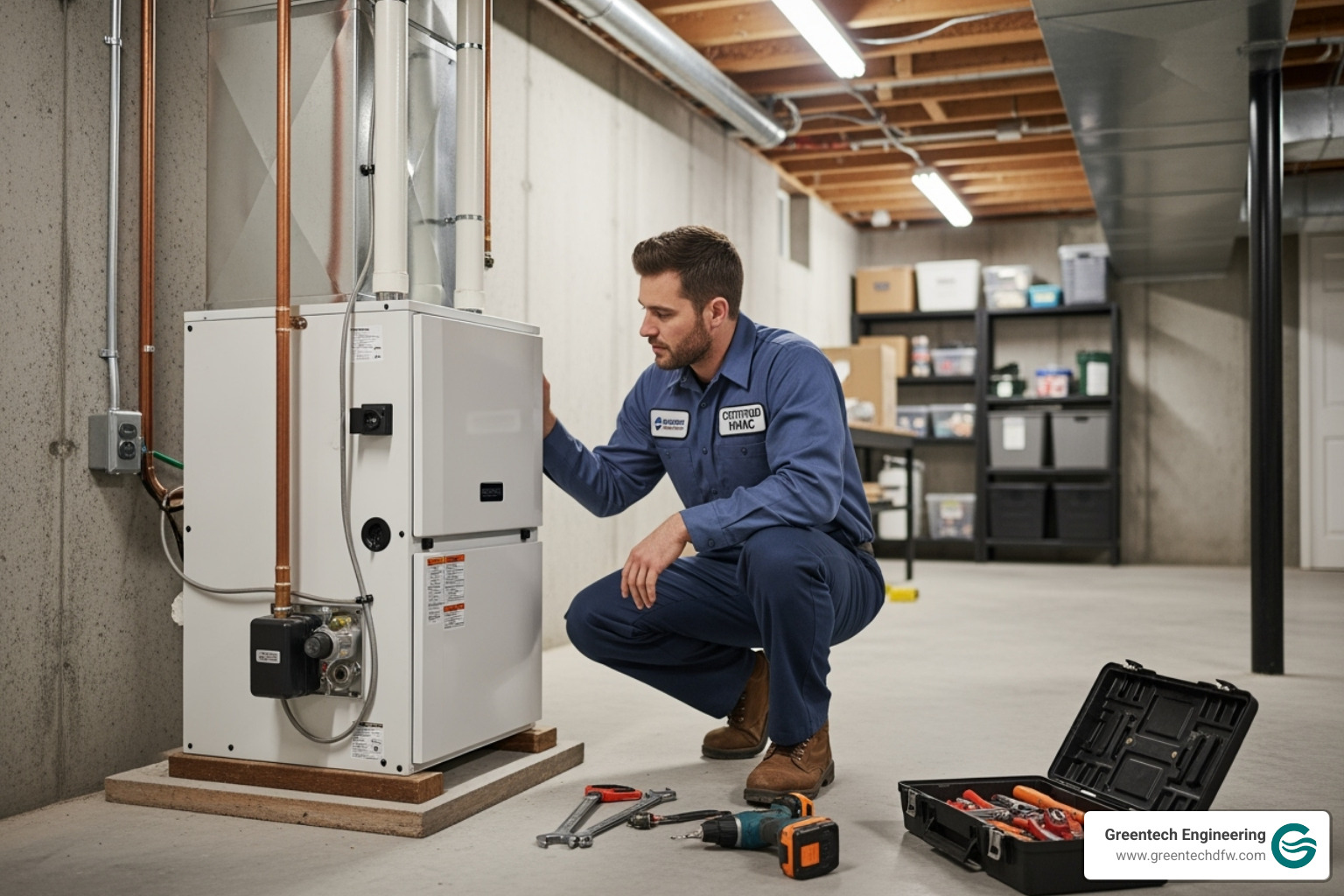Why Dallas Homeowners Need Reliable Heating Systems
When your Dallas heating replacement becomes necessary, acting quickly ensures your family stays comfortable. While Dallas winters are milder than in northern states, temperatures can drop significantly, making a reliable heating system essential for your home’s comfort and safety. A failing heater during a cold snap can be a frustrating and uncomfortable experience.
Top reasons Dallas homeowners need heating replacement:
- System age over 10-15 years – Older units lose efficiency and require frequent repairs.
- Rising energy bills – Inefficient systems work harder to heat your home.
- Frequent breakdowns – Multiple repair calls indicate impending system failure.
- Uneven heating – Cold spots throughout your home signal poor performance.
- Strange noises or odors – Unusual sounds or smells from vents can indicate serious problems.
Modern heating systems can achieve up to 98% efficiency, leading to significant savings on your monthly utility bills compared to older, less efficient units. Knowing when to replace versus repair your current system is key to managing costs and maintaining comfort.
When to Replace vs. Repair Your Heating System
When your heating system acts up on a chilly Dallas morning, you face a common dilemma: repair it again or invest in a replacement? While a repair seems cheaper upfront, a Dallas heating replacement often makes more financial sense in the long run, especially for an aging system.
Key signs indicate it’s time to consider replacement:
- Age: Systems over 10-15 years old run at much lower efficiency than when they were new.
- Frequent repair calls: If you need multiple service calls in a single season, your system is likely failing as major components wear out.
- Rising energy bills: An unexplained increase in your energy bills suggests your system is working overtime and wasting energy.
- Strange noises and odd smells: Grinding, banging, or squealing sounds, along with burning odors, can indicate serious mechanical problems or safety hazards.
- Uneven heating: If some rooms are cold while others are cozy, your system is no longer distributing heat effectively.
For a deeper dive into these warning signs, check out our guides on Signs Your HVAC System Needs Repair and Signs of Furnace Failure That Need Attention.
Here’s how repairing an old unit stacks up against full replacement:
| Feature | Repairing an Old Unit | Full Replacement |
|---|---|---|
| Initial Cost | Lower, for specific parts or fixes | Higher, for a new system and installation |
| Efficiency | Remains low, as old components are still inefficient | Significantly improved (up to 96-98% for modern units) |
| Reliability | Unpredictable, as other parts may fail soon | High, with new components and warranty |
| Comfort | May still experience uneven heating or poor performance | Consistent, even heating throughout your home |
| Energy Bills | Likely to remain high or increase | Substantially reduced due to higher efficiency |
| Lifespan | Extends current system’s life slightly | Provides many years of trouble-free operation |
| Warranty | No new warranty or limited for specific repair | Full manufacturer and installation warranty |
| Peace of Mind | Limited, as breakdowns can still occur | High, knowing your system is reliable and new |
The 15-Year Rule for Heaters
The 10-15 year replacement recommendation is based on how heating systems age and lose efficiency. Even if your older unit still runs, it’s likely working much harder and costing you more in energy bills than a new model would. Most well-maintained units show significant decreased efficiency after a decade. A proactive Dallas heating replacement prevents you from being left without heat during an unexpected cold snap and provides long-term cost savings through lower energy bills and fewer repairs. For guidance on recognizing when it’s time to call in the professionals, visit our page on When to Call Technicians for Heating Issues.
Analyzing Repair Costs
A good rule of thumb is the 50% rule: if a repair costs more than half the price of a new system, replacement is the smarter financial choice. You should also consider the cost of continued repairs. Multiple service calls in one season can add up quickly, all while you’re still dealing with an unreliable system. A new system provides system reliability and peace of mind, backed by warranties and modern, efficient technology. The Benefits of Timely Heating Repair Services are clear for a newer system, but for an older one, upgrading is often the best path forward.
Key Considerations for Your Dallas Heating Replacement
Once you’ve decided on a Dallas heating replacement, the next step is choosing the right system. This involves balancing comfort, efficiency, and reliability.
Key factors include Dallas’s climate, your home’s size and layout, available fuel sources, and energy efficiency ratings. Understanding these will help you choose a system that saves money on utility bills.
Choosing the Right System: Furnace vs. Heat Pump
The main choice for Dallas homeowners is between a furnace and a heat pump.
- Gas furnaces are popular for delivering powerful, rapid heat. Modern furnaces have high Annual Fuel Utilization Efficiency (AFUE) ratings, meaning most of the fuel directly heats your home.
- Electric furnaces are an option if natural gas is unavailable, though electricity is often a more expensive heating fuel.
- Heat pumps provide both heating and cooling in one unit. They are highly efficient in Dallas’s mild climate, moving heat from the outside air into your home. During extreme cold, they use supplemental electric heat.
- Dual-fuel systems combine a heat pump with a gas furnace, offering the best of both worlds. The system uses the most efficient method based on the outdoor temperature.
Our technicians can help you understand these options and diagnose existing issues. Learn more about Common Heating Problems Fixed by Technicians.
Understanding Energy Efficiency and Sizing
When investing in a new system, efficiency ratings are key to long-term savings.
For furnaces, the Annual Fuel Utilization Efficiency (AFUE) rating indicates how much fuel becomes usable heat. High-efficiency models with AFUE ratings of 96-98% offer significant savings, often paying for their higher initial cost over time.
For heat pumps, look at the Seasonal Energy Efficiency Ratio (SEER) for cooling and the Heating Seasonal Performance Factor (HSPF) for heating. Higher numbers mean lower utility bills.
Proper system sizing is also critical. An oversized system will “short-cycle,” turning on and off frequently, which causes uneven temperatures, wastes energy, and increases wear. An undersized system will run constantly without adequately heating your home, leading to high bills and discomfort. We perform detailed load calculations—considering square footage, insulation, windows, and more—to ensure your new system is perfectly matched to your home. This scientific approach guarantees optimal performance and efficiency. The risks of improper sizing are significant, as explained in this article about The risk of oversized HVAC systems.
The Professional Installation Process
When you move forward with your Dallas heating replacement, you can expect a thorough, professional process designed for clear communication and perfect results.
The process begins with an initial consultation and home assessment, where our experts perform detailed load calculations to determine your home’s exact heating needs. Based on this, we help you with system selection, presenting customized options and explaining the pros and cons of different models and efficiency ratings.
On installation day, our team works efficiently and respectfully. We safely remove your old unit and precisely install the new one, ensuring all connections meet safety codes. We also perform a ductwork inspection and recommend adjustments to ensure optimal airflow.
Before finishing, we conduct rigorous testing and calibration to confirm your new system is running perfectly. Finally, we do a customer walkthrough to explain your new system’s features, operation, and maintenance needs.
For more insights, see our page on the Importance of Professional Heating Repair.
Why Professional Installation is Crucial for Your Dallas Heating Replacement
Professional installation for your Dallas heating replacement is essential for safety, performance, and protecting your investment.
- Manufacturer Warranty: Most manufacturers require installation by a licensed contractor to keep the warranty valid.
- Safety Codes: Professionals ensure your system meets all local building codes, protecting your family from hazards like gas leaks or electrical fires.
- Optimal Performance: Proper installation is key to achieving the efficiency and comfort you paid for. A poorly installed system will have higher energy bills and reduced comfort.
- System Longevity: Correct installation reduces stress on components, extending the system’s lifespan.
- Expertise and Experience: Our NATE-certified technicians have the training to handle every aspect of the installation with precision.
Choosing professional installation means choosing peace of mind. Learn more about Why Heating Repair by Professionals.
Post-Installation: Maintaining Your New System
After your Dallas heating replacement, regular maintenance will keep your new system running at peak performance for years.
- Annual Professional Tune-Ups: Schedule a tune-up before each heating season to inspect, clean, and calibrate the system, preventing major issues.
- Regular Filter Changes: Check your air filter monthly and replace it every 1-3 months to ensure proper airflow and prevent strain on the system.
- Keep Vents Clear: Ensure furniture, rugs, or drapes do not block vents. Keep outdoor heat pump units clear of debris.
- Observe Your System: Pay attention to any unusual noises or smells, which could indicate a problem that needs professional attention.
Following these steps will ensure your new system operates efficiently for years. For more tips, check out our HVAC Blog.
Benefits of Upgrading to a Modern Heating System
Investing in a Dallas heating replacement with a modern system is a smart decision for your home, offering improved comfort and a strong financial return.
The most significant benefit is improved energy efficiency. Today’s high-efficiency units (up to 98% AFUE for furnaces) waste far less energy than older models, which might operate at only 60-70% efficiency. These savings on your utility bills add up over time, helping to offset the initial investment.
Other key benefits include:
- Consistent, Comfortable Heating: A new, properly sized system eliminates cold spots and delivers even, reliable heat throughout your home.
- Improved Indoor Air Quality: Advanced filtration technology captures dust, pollen, and other airborne particles, creating a healthier living environment, especially for those with allergies.
- Increased Home Value: An updated, energy-efficient HVAC system is an attractive feature for potential buyers, enhancing your property’s value in the Dallas market.
- Reduced Environmental Impact: High-efficiency systems consume less energy, which lowers greenhouse gas emissions.
Your new heating system is an upgrade to your entire living experience. For comprehensive HVAC solutions, explore our Dallas AC Replacement & Installation Services.
Frequently Asked Questions about Heating Replacement
Investing in a Dallas heating replacement is a major decision. Here are answers to some of the most common questions we receive from Dallas homeowners.
How long does a typical heating system last in Texas?
A well-maintained furnace typically lasts 15-20 years, while a heat pump’s lifespan is about 10-15 years. Dallas’s climate, with its hot summers and cold snaps in winter, means HVAC systems work hard year-round. This usage can affect longevity, which makes regular annual maintenance essential to maximizing your system’s lifespan.
How can a new heating system improve my home’s air quality?
Modern heating systems feature advanced filtration technology that is far superior to older units. They can capture a much higher percentage of dust, pollen, pet dander, and other airborne particles. Many new systems are compatible with higher-MERV filters, which trap smaller particles that older systems miss. This results in cleaner, healthier air throughout your home, which is especially beneficial for family members with allergies or respiratory issues.
What are the signs of an improperly sized heating system?
Proper sizing is critical for efficiency and comfort.
- An oversized system will heat the space too quickly and shut off, a process called “short-cycling.” This leads to uneven temperatures, increased wear on components, and wasted energy.
- An undersized system will run constantly while struggling to reach the desired temperature. This results in high energy bills and an uncomfortable home because the unit cannot keep up with the heating demand.
This is why we perform detailed load calculations for every Dallas heating replacement, ensuring your new system is perfectly sized for your home’s specific needs.
Conclusion
Choosing a Dallas heating replacement is a straightforward process with the right team. We’ve covered the signs that it’s time to replace your old unit, the key factors in selecting a new one, and the benefits of upgrading to a modern, high-efficiency system.
Replacing your heating system is an investment in your home’s future, providing improved energy efficiency, consistent comfort, and better indoor air quality. It also offers the peace of mind that your home will stay warm during Dallas’s unpredictable winter weather.
Professional installation is essential to maximizing these benefits. A properly sized and expertly installed system ensures years of reliable, efficient operation. At Greentech Engineering, our honest, straightforward approach focuses on finding the right solution for your home and needs.
Don’t wait for a breakdown. Be proactive about your Dallas heating replacement to ensure your home is prepared for winter.
Ready to take the next step? Schedule your HVAC service in Plano, TX today! Our experienced team is here to guide you. For all your heating needs, you can Trust Our Professionals for Heating Repair and replacement services.



